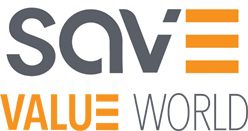By Timme Hendriksen, CVS, PVM, TVM – Coordinator Value Management, ProRail; and Koen Schmitz, PVM, TVM – Policy Advisor Cargo/Value Manager, ProRail
Are value studies enough to ensure that the organization receives maximum value for money? The answer is no. Research on the effectiveness of the ProRail Value Management program shows all conditions for successful Value Studies are met, resulting in a lot of Value adding proposals. Unfortunately, the full Value potential is not realized. To reach maximum Value potential, three aspects need to be addressed: 1) a continuous focus on Value throughout the project lifecycle, looking at a project from a business goal perspective, 2) implementation of results and 3) timing of the Value interventions. The management of Value needs to be an integral part of the project. Therefore, we introduce a new project management role: The Value Coach.
The Role of the Value Coach
The Value Coach’s task is to line up project delivery with business goals (Value delivery) and is therefore typically initiated by the business owner. It could also be initiated by the project in order to get the business more involved and to streamline the project. The Value Coach helps to integrate Value-improving and Value-assuring processes into project planning, assists with the initiation of Value practices and safeguards the implementation process of Value improving proposals. The Value Coach does not facilitate Value studies, but does participate in them. He or she also cultivates Value culture in the project’s team and business, for example through inspiration and education.
Now let’s first explore three aspects of projects that can be improved by a Value Coach.
Conflicting Interests between Project Management and Value Management
Take the simplified version of the results of a Value study in Figure 1. There are five alternatives, each scored on performance and the estimated investment cost. If the project manager’s budget is € 11 million. Which would he probably pick? He would most likely choose Alternative 3, since this gets the highest performance for the available budget. However, if we look from a business point of view, Alternative 5 might also be interesting. If the lower performance level is acceptable, it offers the business €3 million to invest in something else in order to get a higher total performance for the organization for the same amount of money.
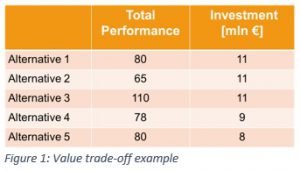
So, Project Management has a task to deliver a specific scope within schedule and budget. A good project does not necessarily lead to best Value for the organization. This requires the involvement of the business owner or client.
The Value Coach can make sure all options get the proper amount of attention from the Business owner.
Too little involvement of the Value Engineer during the implementation of Value study results
In the example shown in Figure 2 below, there are two value proposals resulting from a Value study on increasing the capacity of a train yard. The left option is meeting the customer requirements, while the right one does not fully live up to them, but can be delivered much sooner. The project manager discarded the latter proposal during the development phase because it wasn’t meeting customer requirements.
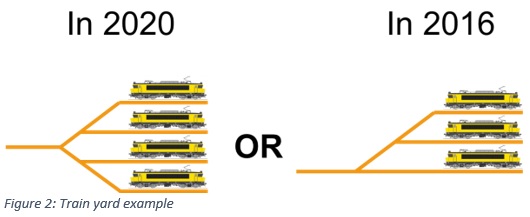
In this particular example, the Value Engineer found out about this by coincidence and was able to intervene. In the end, the client chose the 2016 option and adapted the requirements, because the client decided that an earlier delivery was more important than a few more train carriers (thereby modifying the requirements). We believe that it is the task of a Value Engineer to look beyond the project constraints and to present functionally viable alternatives that challenge the customer’s beliefs. To do that, a Value Engineer needs to be part of the implementation process of the Value study results.
Here the Value Coach can also make sure that all options get the proper amount of attention from the Business owner, by making sure all relevant options are presented. The Value Coach should be a sparring partner for project management when reporting to the business.
Inadequate knowledge of Value Management in project teams
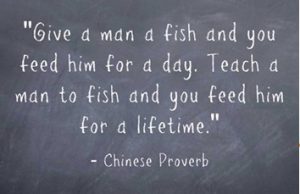 Probably the biggest irritation of a project manager towards VE is its impact on schedule and cost due to rework as a result of changes or insights during a value study. Second is the fact that it takes a rather long time to organize a Value study. The background of these irritations is the fact that Value Management is applied in an ad hoc manner. And this relates to the lack of Value Management expertise within project teams. With the right expertise involved in a project, a project can program Value studies in order to strengthen project management.
Probably the biggest irritation of a project manager towards VE is its impact on schedule and cost due to rework as a result of changes or insights during a value study. Second is the fact that it takes a rather long time to organize a Value study. The background of these irritations is the fact that Value Management is applied in an ad hoc manner. And this relates to the lack of Value Management expertise within project teams. With the right expertise involved in a project, a project can program Value studies in order to strengthen project management.
Through education and well-planned interventions, the Value Coach can help deploy Value Management in a project in the best possible way.
Value Coach example: Caland Bridge
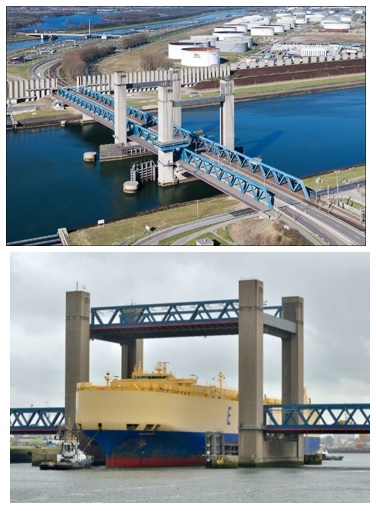 Now let’s explore what can happen when there is adequate Value Management expertise present in a project team. In this particular project, the Caland Bridge, the project’s Systems Engineer is also an experienced Value Engineer (PVM). The Systems Engineer manages all requirements for a project, making sure the designs are compliant with these requirements. With his knowledge as a senior Value Engineer he took on the role of Value Coach and made sure that all elements of VM were deployed in the best way and help the project team make sure the project would align with business goals.
Now let’s explore what can happen when there is adequate Value Management expertise present in a project team. In this particular project, the Caland Bridge, the project’s Systems Engineer is also an experienced Value Engineer (PVM). The Systems Engineer manages all requirements for a project, making sure the designs are compliant with these requirements. With his knowledge as a senior Value Engineer he took on the role of Value Coach and made sure that all elements of VM were deployed in the best way and help the project team make sure the project would align with business goals.
The project at hand is the Caland Bridge, a steel vertical lift bridge, which connects the Port of Rotterdam to the rest of Europe for Rail Cargo. Good connections to the rest of Europe are key to maintain the status of the biggest port in Europe. There are two urgent problems with the bridge:
- The Bridge will be at the end of its expected useful life in 2020.
- Rail Cargo growth is limited because ships have a right of way over trains.
The Value Coach designed a two-step process:
- A Value study was initiated to generate 3 alternatives. To ensure that the project had sufficient political consensus, all relevant stakeholders, including ProRail, the Harbour Authority, the surrounding companies and municipalities, were involved in the study.
- After elaborating these 3 Alternatives, two classic Value studies were organized to optimize the two most favourable alternatives, creating a new route for Rail traffic and renovating the Bridge.
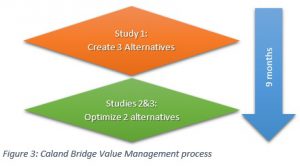
The whole process took about 9 months and led to the following results:
- A multi-million euro saving of 14% on an alternative route
- Disruption was reduced by 67% for the renovation alternative
- The design for the alternative route was approved within 1½ years versus approximately 3 years in a regular process
- The design for the alternative route has the best fit for business needs.
- Various parties invested double the amount of money originally intended by the business owner
The first two results may have been achievable just by performing a Value study. However, we believe the bottom three results are related to the Value Coach role.
Through these Value studies, both alternatives were brought within an acceptable range for the Ministry of Transport.
How do we make it work?
Based on five large projects and programs where the Value Coach role has been more or less applied, we see that the Value coach can be deployed in three ways:
- As part of the project/program organization, like the Caland Bridge case. An existing project role such as technical or Public Relations takes on the role of Value Coach. This application implies that the individual has a broader field of attention than the project at hand. This could lead to potential conflicts between business and project interests. Therefore, the Value Coach needs a proper business mandate and the project’s buy–in to be effective. On the other hand, a project team member knows what is best for the project and can tailor and embed Value processes in the best possible fashion. The downside of this application is that the project team member may focus too much on the project and lack the bigger picture and critical attitude needed to fulfill the role of Value Coach.
- External expertise. The project or business hires an external Value Coach from outside the project, to assure Value delivery of the project. Based on the planning of value processes at the start of the project, s/he checks in at given times and will be informed on the project’s progress, as the project will be continuously subject to change.
- A combination of both of the above: have an internal Value Coach to embed Value processes in the project and to identify potential value risks, and an external Value Coach to periodically assure value delivery and advise business.
Where are we heading?
Our ambition is to position Value Management between the business and projects/programs. Value Management can provide the business with more insight on whether the project really is the best fit for their needs and what other trade-offs could be made on a portfolio level. Projects and Programs would get a better understanding of what is really important for the business and would develop the project accordingly.
In ProRail, we are looking at a combination of internal and external Value Coaches. There are 7 Value Engineers in place who can fulfill the Value Coach role, 2 external and about 5 internal. And we are training and guiding more system engineers and project developers in Value Management to fulfill the internal Value Coach role. This is a relatively easy thing to do, since Systems Engineering and Value Management are highly complementary to one another. Project managers will be trained in Value Management to truly understand the approach and get their buy-in.
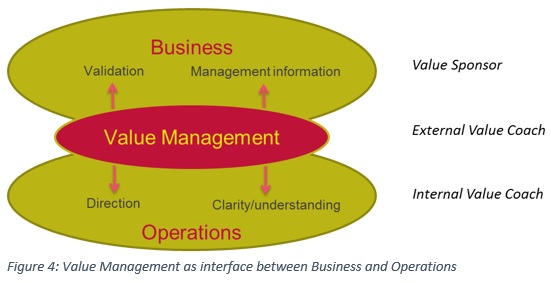
The main challenge is the change in the decision-making processes. In order to make that change, we are looking for Value Sponsors to introduce and implement Value thinking in the business and management level of the organization. The business should be convinced of this approach in order to invest in an external Value Coach. Another challenge for the external Value Coach is to be involved at the start of the project in order to integrate the Value process in the project’s planning or program organization.
At the moment, we can state that in the past 15 years a good foundation has been laid for Value Management in project management, onto which the role of the Value Coach can be built. On the business side, Value Management still needs (some) missionary work. The Value Coach as a linchpin to a project could be just the catalyst to create a sound foundation on the business side as well.
A version of this article was originally published in the March 2018 issue of VIEW on VALUE.
